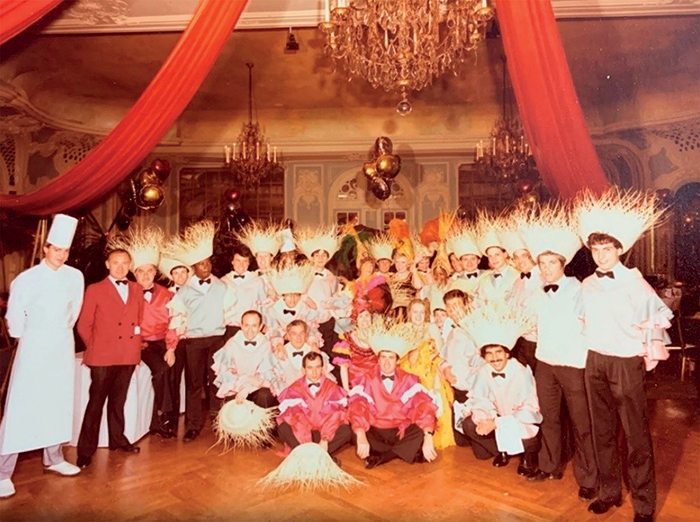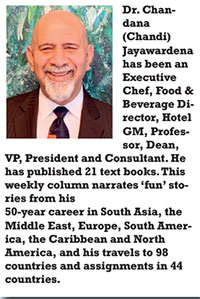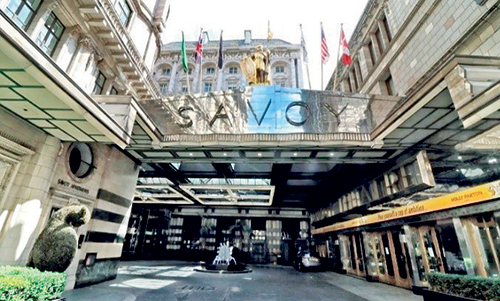Features
Writing Postponed to Serve the Queen

CONFESSIONS OF A GLOBAL GYPSY
RESEARCH AT 16 FIVE-STAR HOTELS – PART ‘B’

By Dr. Chandana (Chandi) Jayawardena DPhil
President – Chandi J. Associates Inc. Consulting, Canada
Founder & Administrator – Global Hospitality Forum
chandij@sympatico.ca
Continuing from last week’s column: ‘Research at 16 Five-star Hotels – Part ‘A”.
I postponed writing my M.Sc. dissertation on ‘Food and Beverage operations in the context of five-star London hotels’ several times, due to my ever-expanding field research. I was required to start writing the chapters without any further delays. I was reminded by the University of Surrey, in the United Kingdom that I must submit the final dissertation before the end of September, 1984, if I was to graduate in December that year.
I was focusing too much on gaining valuable experiences in London’s five-star hotels, which I believed would enhance my dissertation, eventually when I could commit myself to writing it. Another reason for my procrastination was my fear of writing something very long in my second language. Apart from a few assignment essays at the University of Colombo and the University of Surrey between 1982 and 1984, I had never written anything of significant length in English.
In my career in hospitality, I have been fortunate to be offered various, rare opportunities. Due to such an opportunity, I decided to postpone my research by one more week. One day, when I went to do a shift as a banquet waiter at the Dorchester, I was asked to attend a special meeting chaired by the Food and Beverage Manager, the Banqueting Manager and the Training Manager. A group of over 50 employees, including Banqueting Service Managers, Ballroom Head Waiters, Banquet Waiters, and part-time Banquet Waiters were at this meeting which seemed important.

The Banqueting Manager announced that, “After a lengthy negotiation, our hotel sales team has secured a prestigious banquet booking. This would be our first-ever royal banquet. The Emir of Bahrain will host a banquet in honour of Her Majesty Queen Elizabeth II and His Royal Highness Prince Philip. It will be attended by 277 VIPs.” The Training Manager added, “We will carry out a week long, fully-paid banquet service refresher training program for all of you. There will be a practical test and a multiple-choice exam at the end. Based on the results of those, we will choose a brigade of 30 waiters to serve at the royal banquet. The best five Banquet Waiters will serve the head table, where the Queen, Prince Philip, the Emir, the British Prime Minister, the Lord Chancellor and the Speaker would be seated.”
The special training program was well-planned and comprehensive. I had an advantage due to the first-class, basic service training I had received a decade ago. This was from the food and beverage service experts from West Germany and Switzerland, when I was a student of the Ceylon Hotel School. I was also trained in banquet service at the inception of Hotel Ceylon InterContinental. Therefore, I did well at the practical test and the exam. I was chosen to serve the Queen, Prince Philip, the Emir, and Margaret Thatcher, in the heart of London at the best British hotel.
The Final Hotel – The Savoy
Having worked at seven of the 16 five-star hotels in London (The Dorchester, The Churchill, Grosvenor House, Hyde Park Hotel, Claridge’s, London Hilton and InterContinental London), I planned to research the other nine five-star London Hotels with short observation periods and at least one research interview per hotel. With diligent effort and follow up, I managed to do so in eight of the remaining five-star hotels in London – Connaught, The Ritz, Mayfair, Hyatt Carlton, Royal Garden, Inn on the Park (Four Seasons), Berkeley and Sheraton. I had one final bridge to cross in order to reach my ambitious target of doing field research in all 16 hotels. I was missing The Savoy.
For my research, I had read many books written about luxury British hotels with historical importance. Most of these books were written about The Savoy, which was opened in 1889 under the leadership of a world-famous, hospitality expert duo – the Swiss Hotelier, César Ritz and the French Chef, Auguste Escoffier. I was simply fascinated with the stories in these books. I was eager to work in this great hotel, to experience its renowned luxury standards.
One day, I was excited to find a letter in my mailbox with the logo of The Savoy. It was from one of the most respected hoteliers in London. The General Manager/Managing Director of The Savoy, Willy Bauer sent me a lengthy letter, responding to my request to allow me to spend a few hours making observations at The Savoy and to interview the General Manager or a senior member of his management team. Although he took time to wish me luck with my research, he declined my request. He ended his letter by stating, “The management team of The Savoy are extremely busy ensuring that we provide the best service to our customers. Therefore, unfortunately, they have no time to waste on educating graduate students!”
I felt that his letter, although polite, had a subtle sarcasm. That rejection motivated me to somehow get into The Savoy and find a way to observe the operation and interview a relevant manager. I immediately took a 10-stop underground train ride to Charing Cross station and a five-minute brisk walk to The Savoy. Once there I requested to meet with the Banqueting Head Waiter. After inspecting my Banquet Waiter identification cards from four other London five-star hotels, and hearing how I was chosen to serve the Queen at the Dorchester, I was hired as a Part-Time Banquet Waiter of the Savoy, starting the very next day. When I demonstrated my ability to carry six plates of hors-d’œuvres, in two hands, the Head Waiter said, “The Savoy is not a circus! Never carry more than two plates at a time!”
I was very happy working at the Savoy. Unlike the newer five-star hotels, such as London Hilton and InterContinental London, the back of the house of The Savoy was not designed well for efficient operations. During one banquet service in the main ballroom, the waiters had to go up and down three different floors to pick up the appetizers, main courses and desserts. Nevertheless, I was pleased to climb those century old stairways used by Ritz and Escoffier.
I saw Willy Bauer a couple of times, but never had the opportunity of approaching him. Within a week of working at the Savoy, I had conducted an hour-long interview with a very helpful, Adrian Coy, the Banqueting Manager, who shared many useful documents including the full organization chart of the great hotel. “Mission completed! If there is a will, one will find a way!” I thought for myself.
Completing 120 Field Research Interviews
A few days later, I did my final interview, which turned out to be one of the best. This was with Michael Nightingale, a Management Consultant. We had two connections. He had done an M.Phil. degree at the University of Surrey, and previously ran the Hotel & Catering International Management Association (HCIMA) as the Director (CEO). He was a fellow of HCIMA and I had just been upgraded as a member (MHCIMA). As a result, Michael treated me like a colleague or a peer.
“After your breakfast service at The Savoy, let’s meet at the Charing Cross Hotel for a meal, and you can ask me your research questions over lunch” Michael said. I had an excellent interview. A few months after that, Michael migrated to Canada. He eventually became a Professor and the Chair of the School of Hospitality and Tourism Management at the University of Guelph. In the late 1980s, my wife studied hotel management under his leadership. Fifteen years after that, I became the President of HCIMA in the United Kingdom. Small world!
By early August, 1984, when my research supervisor heard that I had not yet commenced writing my M.Sc. dissertation, he was annoyed and concerned. Professor Richard Kotas said, “It will be impossible for you to write a master’s dissertation within the remaining six weeks! Chandi, I advise you to write an official letter to the university, requesting an extension of a semester to complete the dissertation requirement.” I replied, “No sir, I don’t have the money to pay for an extra semester. I have read all the relevant books and articles. I worked or observed in all 16 five-star London hotels. I have also done over 120 interviews, with half as structured formal interviews with senior hoteliers. I am now fully ready to write six chapters within six weeks.” We then agreed that I would meet him once a week, on six Mondays with a completed chapter.
Binge Writing for Six Weeks
I stopped working in hotels, socializing, watching TV, reading and all of my other activities, to focus on writing my dissertation. I got into a strict regime of 18-hours of writing a day, six days a week for six weeks. Every day, during this period of six weeks, I went to sleep just after 6:00 pm. I started the day at 12 midnight with a hot shower and a small breakfast with a lot of coffee. I continued writing for 18 hours with a short break to say goodbye to my wife who went to work in Knightsbridge around 7:00 am, and to have a quick light 15-minute lunch at 12 noon while watching the BBC TV news headlines.
I stopped writing when my wife came home around 6:00 pm. We had a quick dinner together. Then I handed over around 25 pages of handwritten (I could not type at that time) sections of my dissertation to my wife. She kindly typed all of my notes neatly and placed them on my desk in the attic of our small rented apartment,while I slept for a few hours. When I woke up at 12 midnight, before writing any new material, I would read the pages typed by my wife. We got into an excellent rhythm of teamwork.
After a full-night of dissertation writing in our small apartment in London in 1984
Only on Mondays, I left the apartment to meet with Professor Richard Kotas at the university or his home in West London. Each of our weekly meetings commenced with a critique of my dissertation chapter submitted a week ago. He was amazed, surprised and a little annoyed by the length of my chapters. “You write a lot, Chandi! I have to budget extra time to read, review and edit your work!” he jokingly said. He corrected my English with a red pen and made some other edits or suggestions to improve the manuscript.
When I was shy about my poor English, he said, “Don’t worry, Chandi. English is my second language too. As you think in Sinhala, I think in my mother tongue – Polish.” Once we agreed on the corrections, I handed over the draft chapter with a lot of red pen marks, to a university secretary, who typed the final revisions. After that, I handed over the draft of the next chapter typed by my wife, to Professor Kotas.
The 353-paged Dissertation
I eventually completed my dissertation, within the six-week period, just before the deadline. The full length came to over 100,000 words. The 353-page dissertation referred to 133 previous publications and included 220 quotes in the literature review sections. My field research and my own experience in Food and Beverage operations, enriched the conclusion chapter. One of the Senior Lecturers of the university asked me, “How come your M.Sc. dissertation is longer than two average sized doctoral theses?” Professor Kotas was quick to respond on my behalf, and said the final word in my defence, “Chandi has done some excellent work including in-depth desk and field research. He should be congratulated.”
Within a month, it was confirmed that I had fulfilled all of the requirements and would graduate by the end of 1984. Unfortunately, only four in the first-ever batch of graduate students in the International Hotel Management program were successful in earning the M.Sc. degree. The other five were awarded post graduate diplomas instead, as the university was not fully satisfied with the quality of their work.
Six months after that, in 1985, I jointly presented with Professor Richard Kotas, my first-ever management seminar. This four-day seminar on ‘Food and Beverage Controls and Management’ was organized by our family business, Streamline Services, and was held at Mount Royal Beach Hotel in Sri Lanka. Partly based on my dissertation, we prepared a 143-page seminar book, which was distributed to all of the participants. I presented a session every day. Forty hotel industry leaders, including several general managers, attended this seminar. Most of them were much senior to me in terms of age and years of management experience.
When I was a little nervous if I would be accepted as their instructor for four-days, Professor Kotas decided to do a special introduction to the seminar participants just before my first presentation. He said, “During my 30-plus years spent in the hospitality industry as a manager, academic and a consultant, Chandi has been one of the most hard-working persons I have ever met. To me, he is the most knowledgeable person to present on Food and Beverage Management. Learn from him and enjoy his sessions! Chandi has a ton of useful stories from all five-star London hotels to share with you” That set the stage for me. The popularity of that seminar encouraged me to present a large number of hotel management seminars, around the world, over the next 37 years.
The cover of my first-ever management seminar book A British Textbook based on the Dissertation
Soon after the four-day seminar ended, Professor Kotas and I went through the seminar evaluation forms filled out by the participants, while having a drink on the famous Mount Lavinia beach. We were extremely pleased with the positive feedback. I was taken aback when he asked me, “Chandi, your dissertation has many aspects current and future managers of the hospitality industry would benefit from. Why don’t we convert it to a text book?”
By that time, he had authored over 10 best-selling textbooks and over 50 articles. My publication record then was zero. As I was very busy in my career in hotel management, I suggested that we place it on a back burner. Eventually, in 1994, Professor Kotas and I co-authored a book titled, ‘Profitable Food & Beverage
Until his passing in 2020, Professor Kotas was my long-term mentor. He was like a father to me, and both his wife and Professor Kotas treated me like a son. My last meeting with them was in their London home a few months before my dear friend passed away.